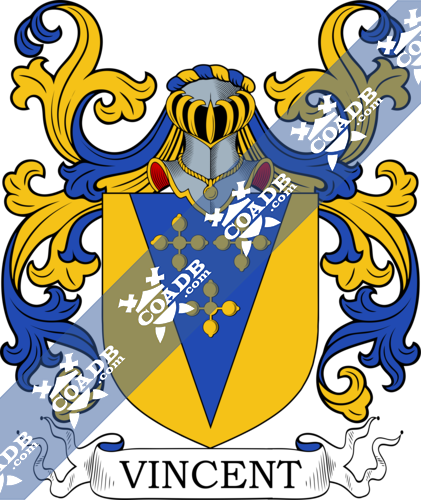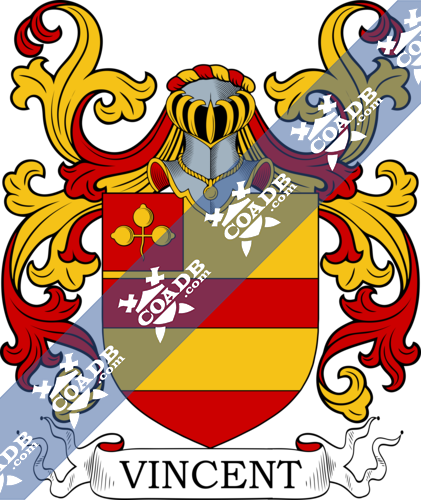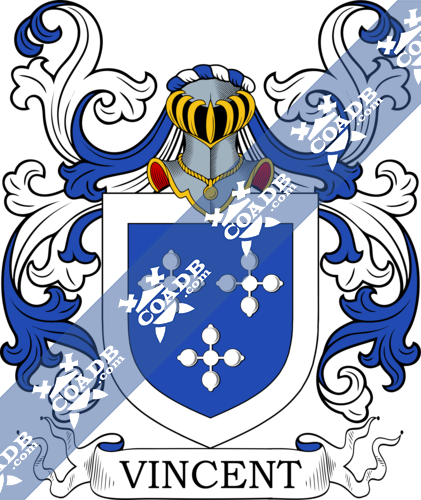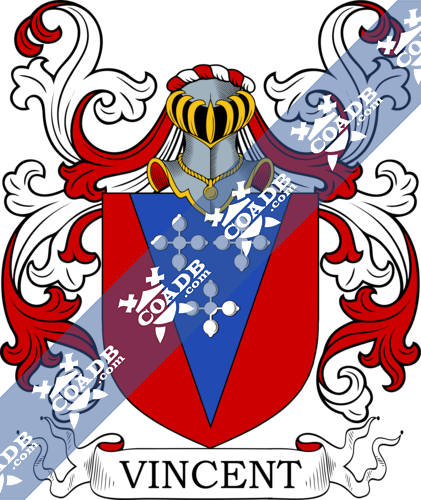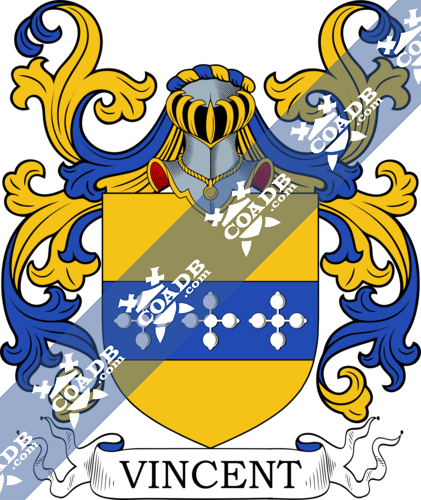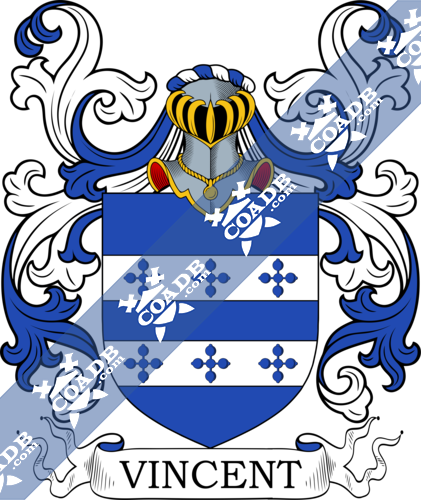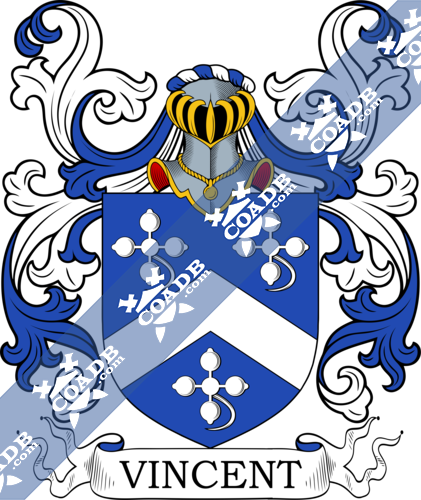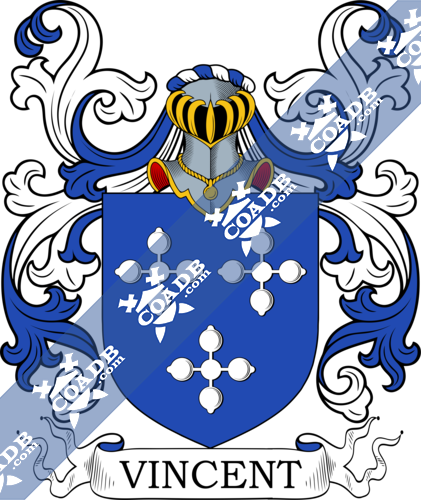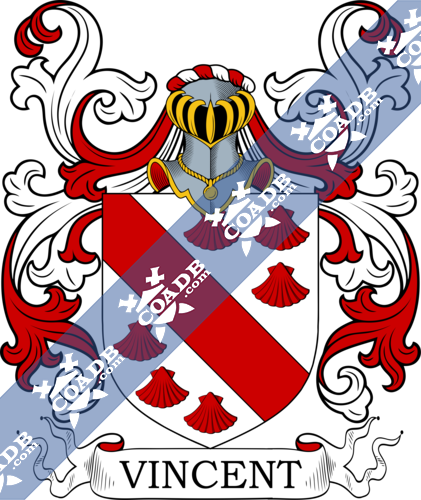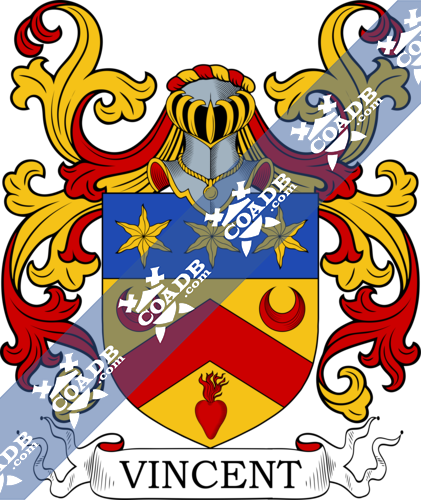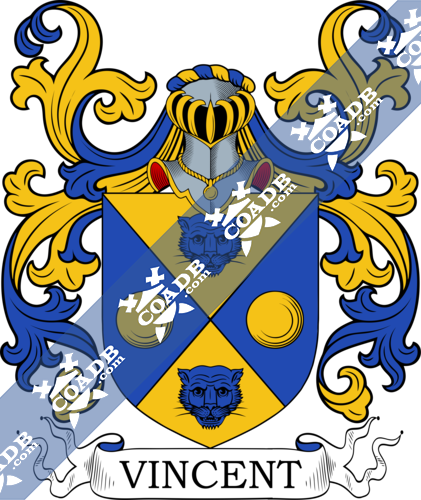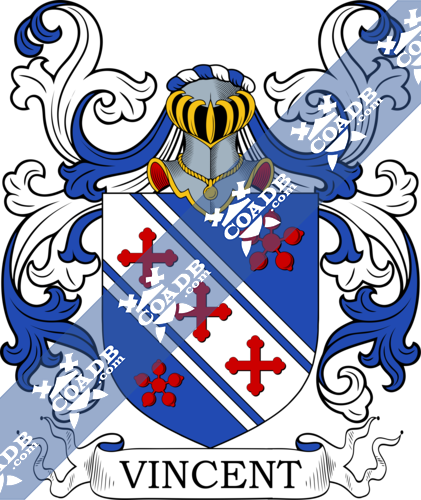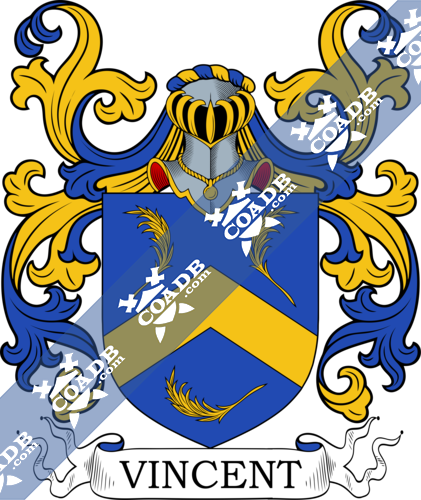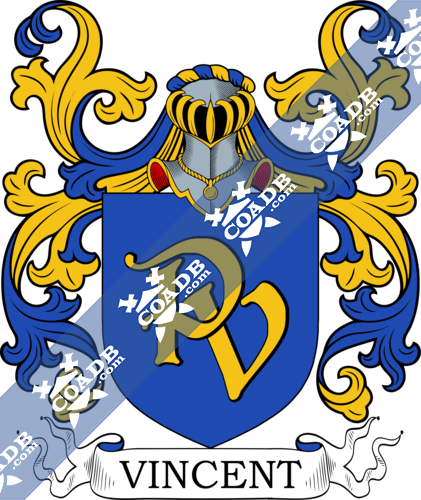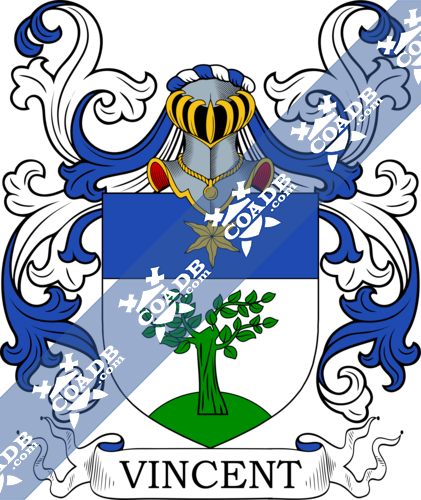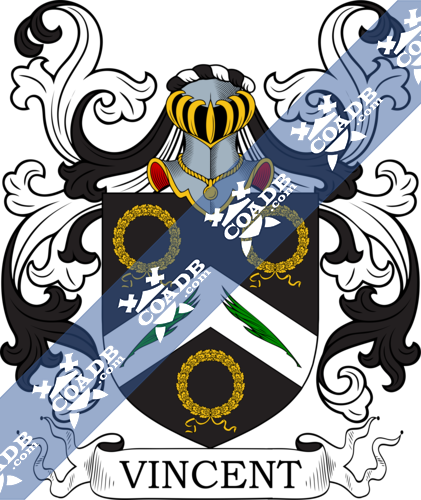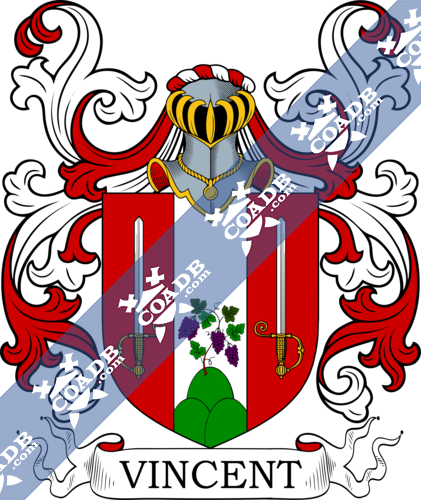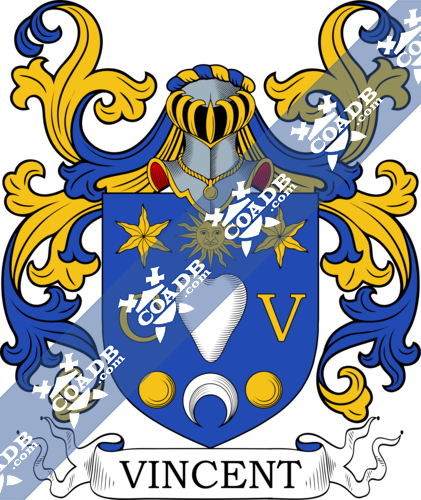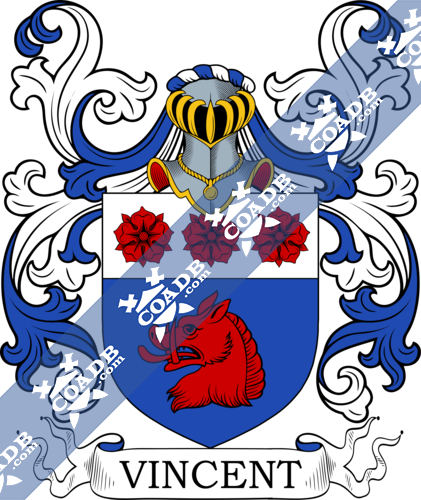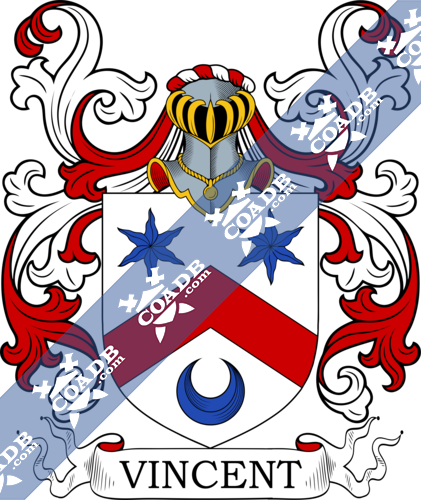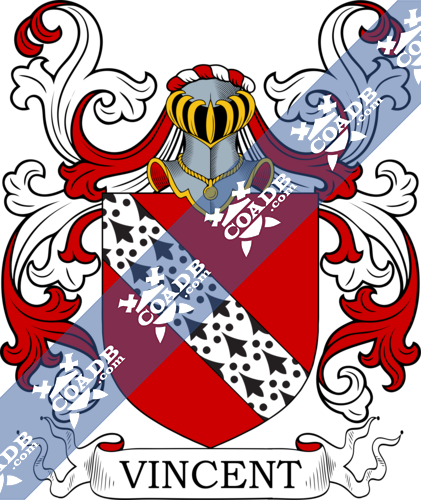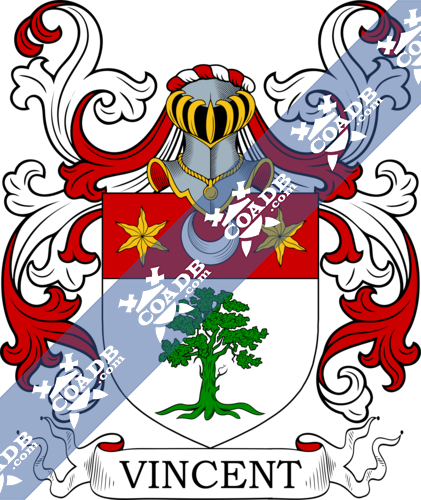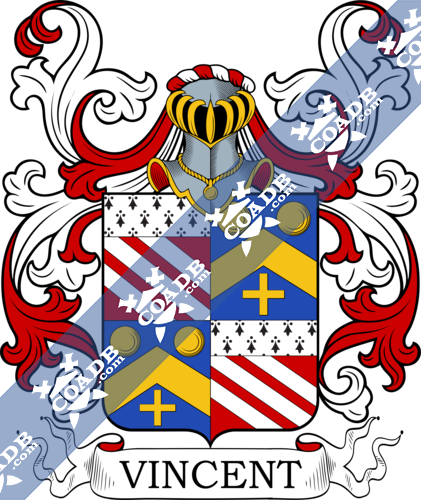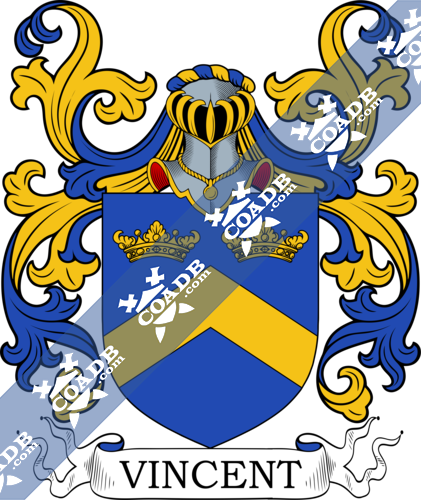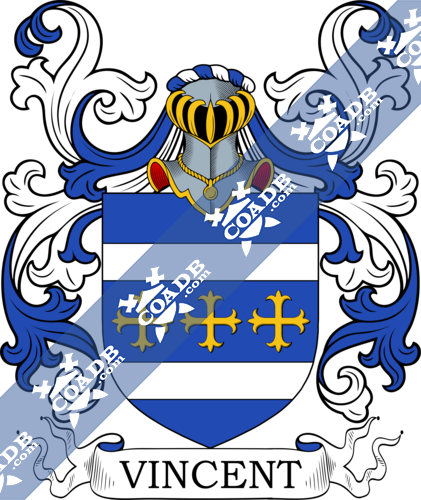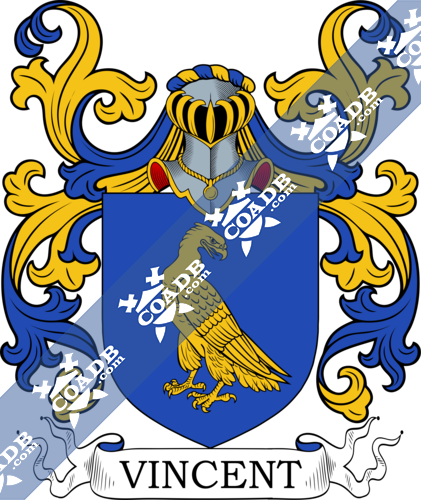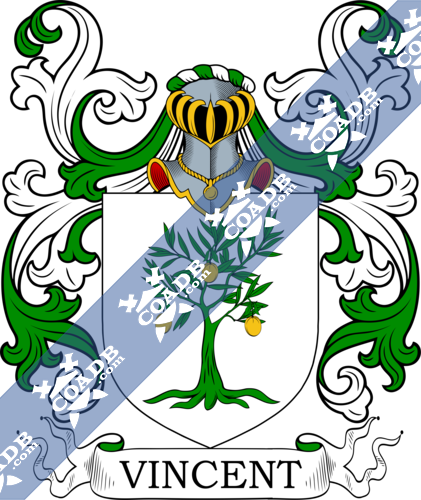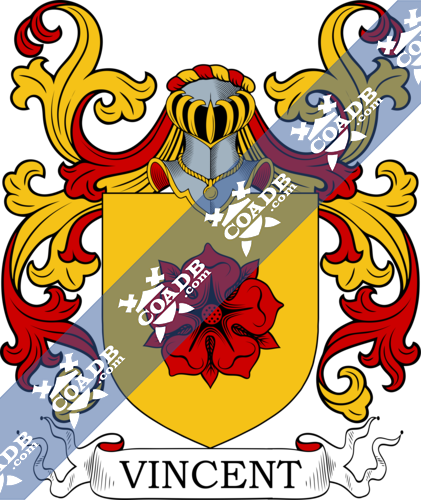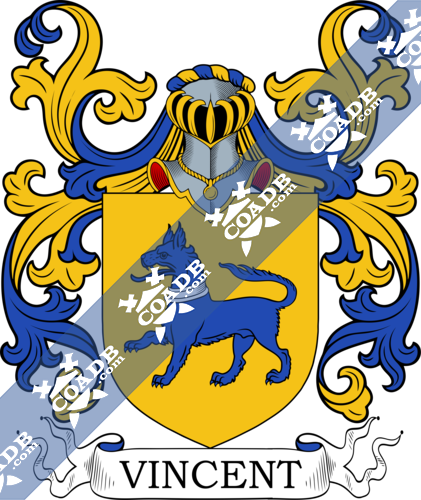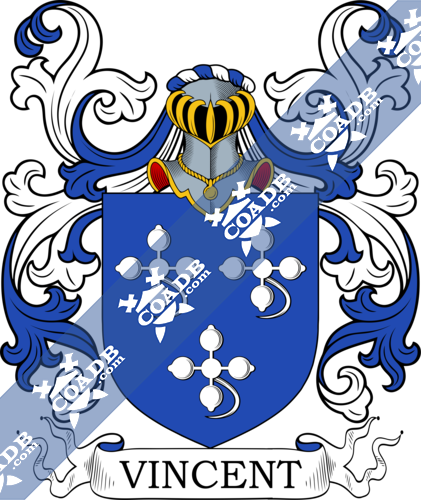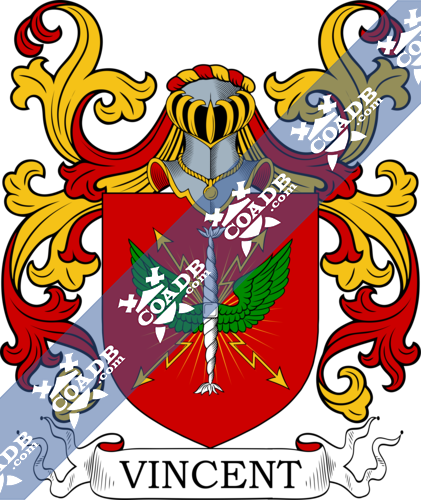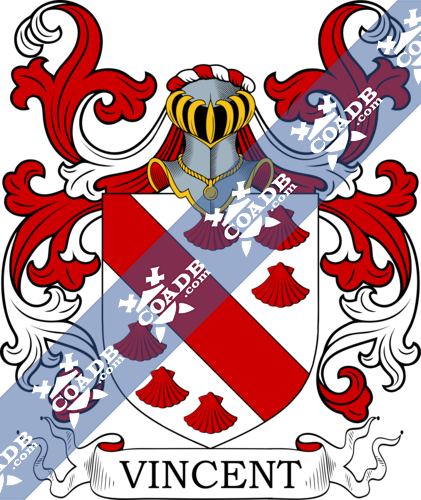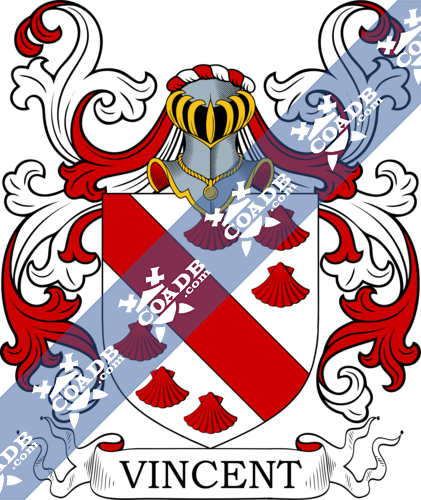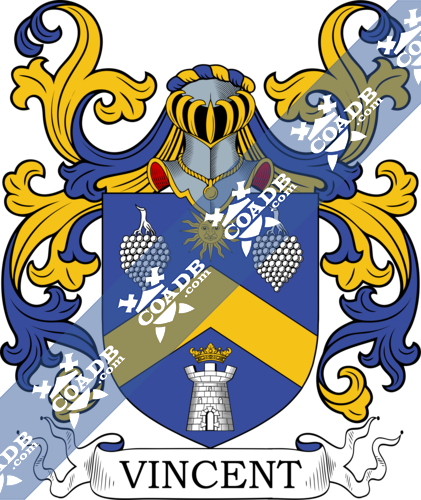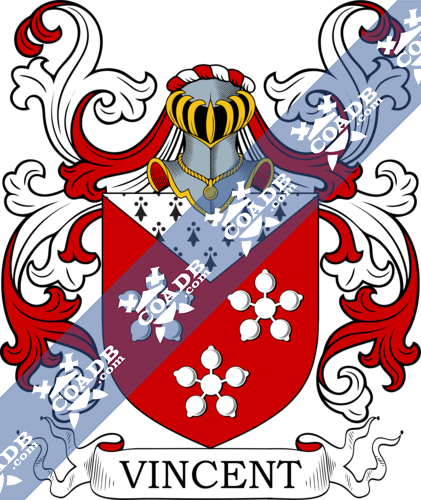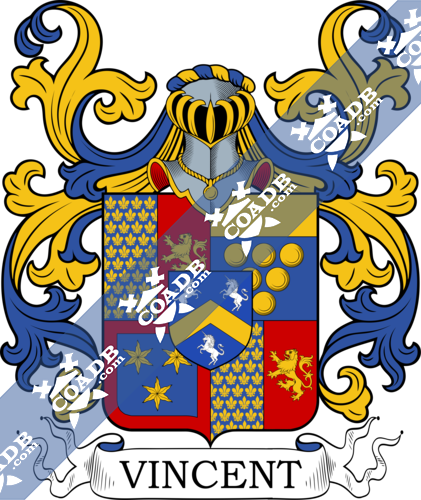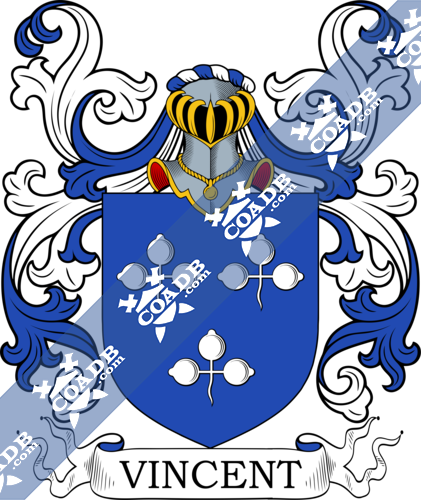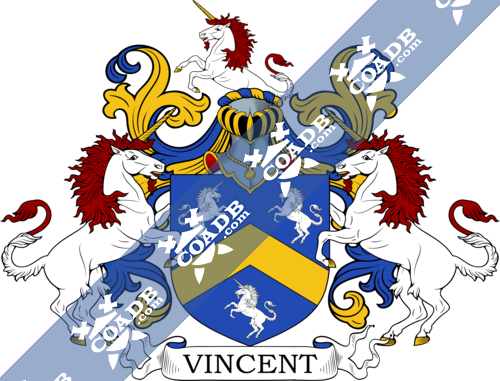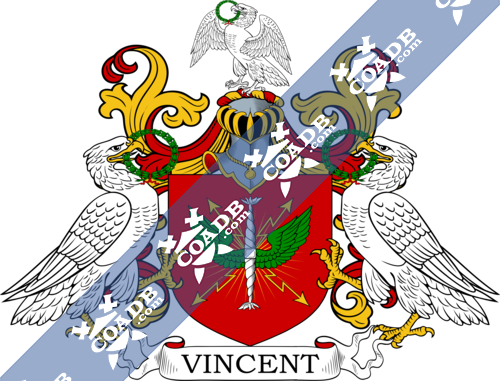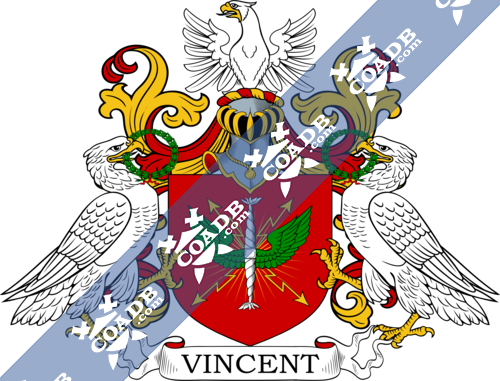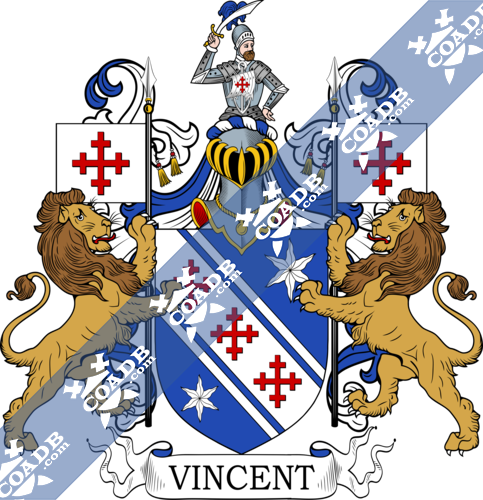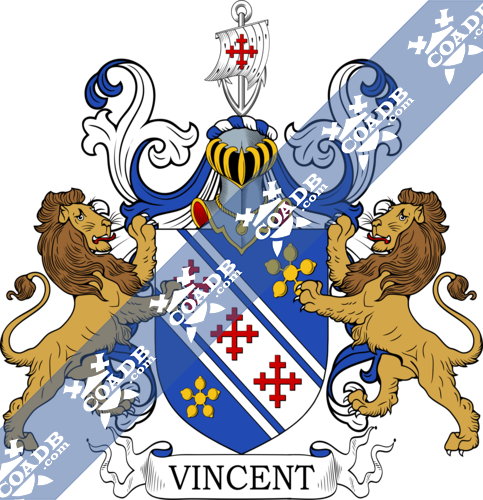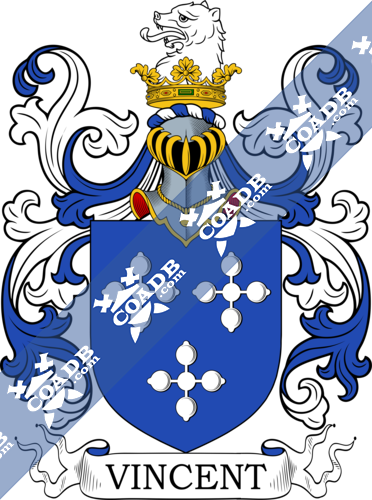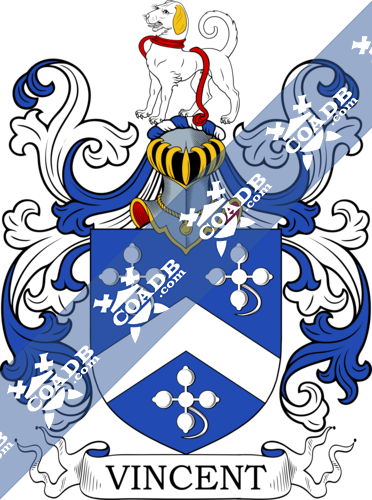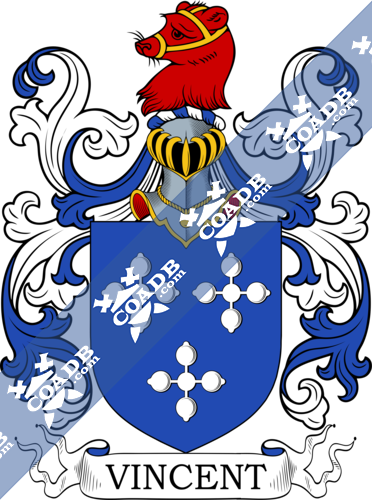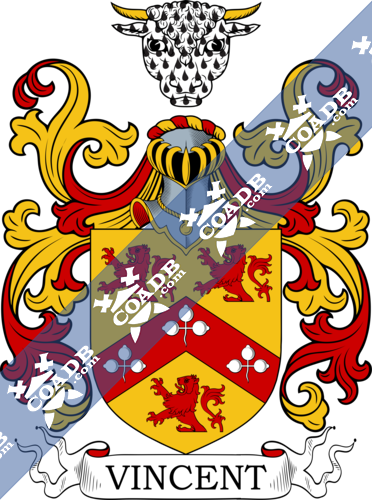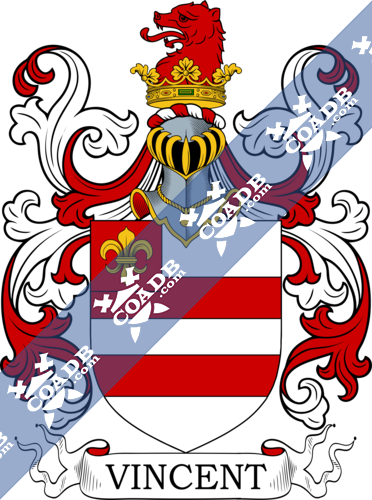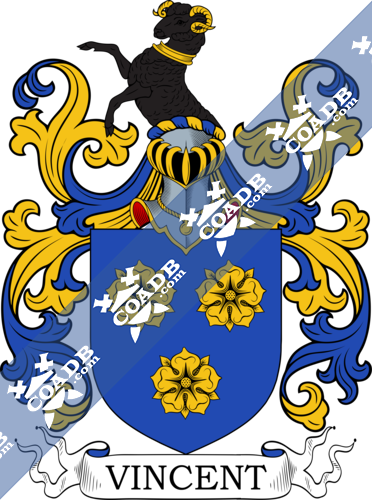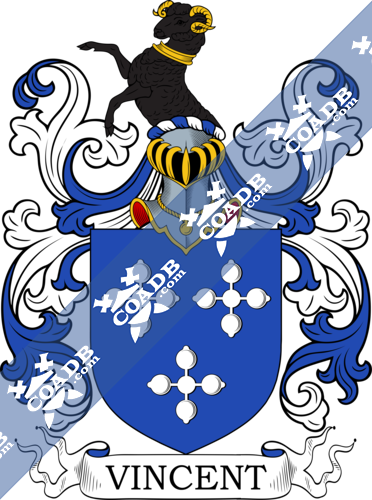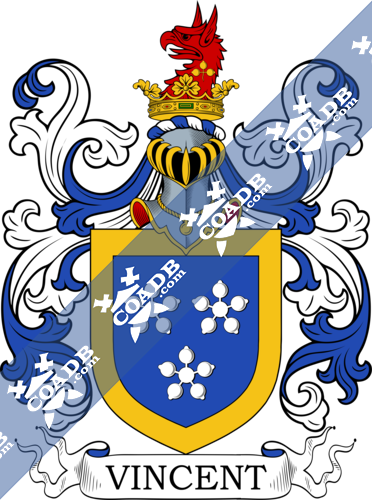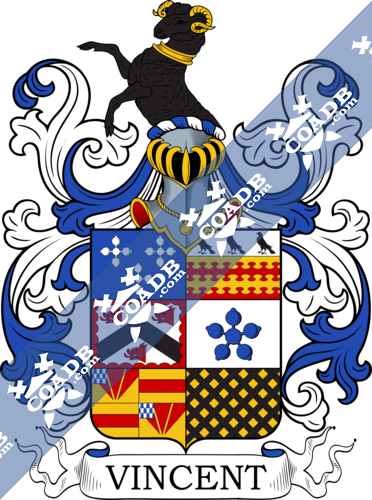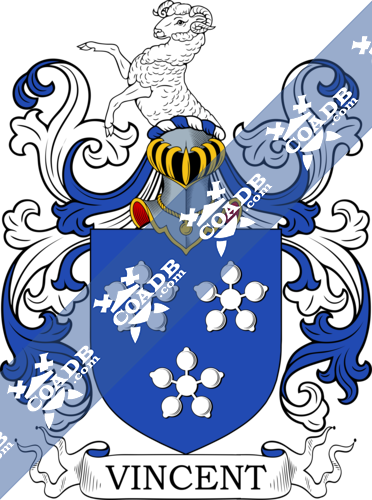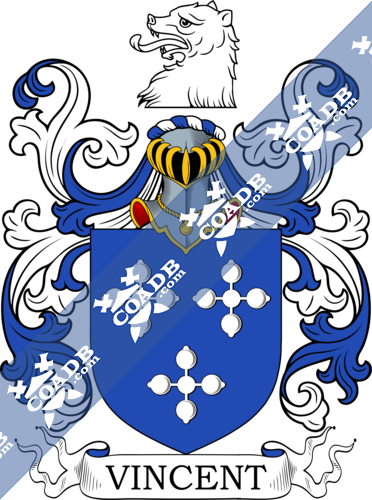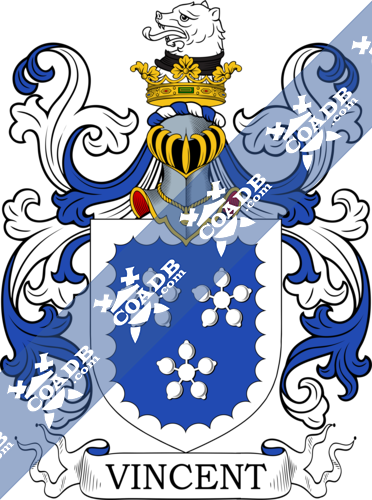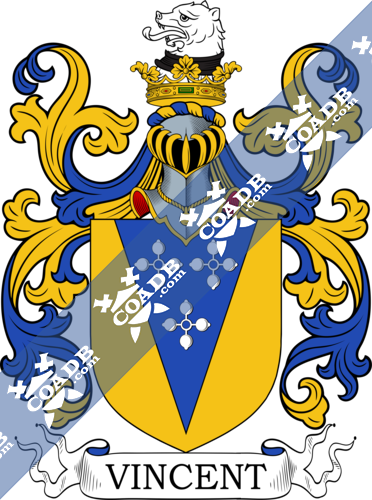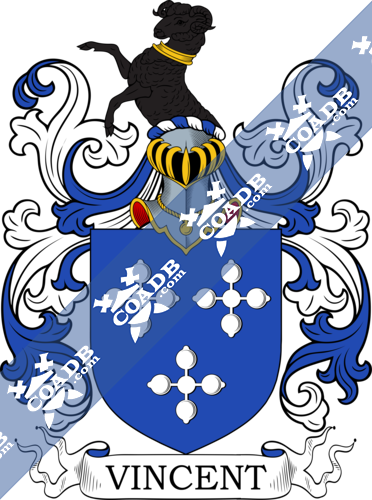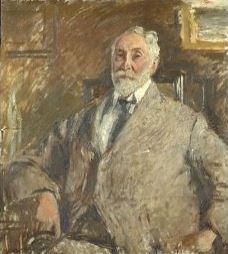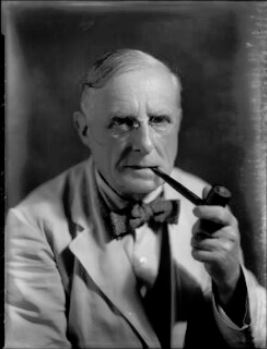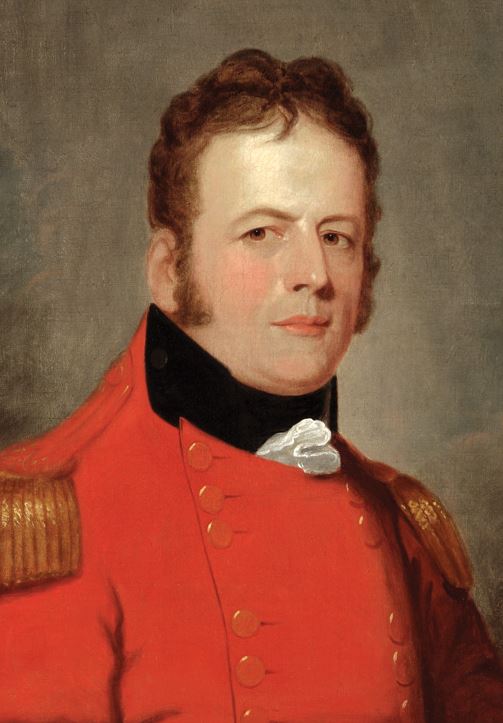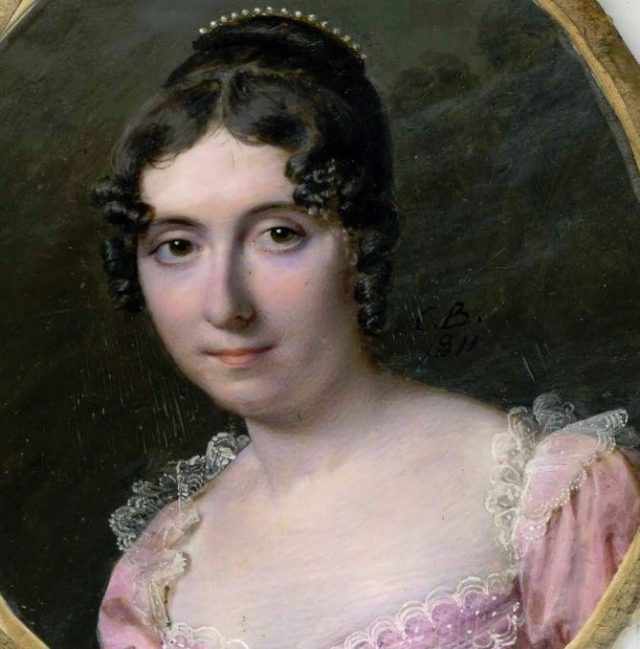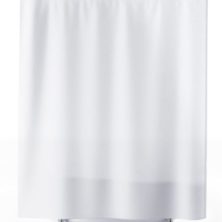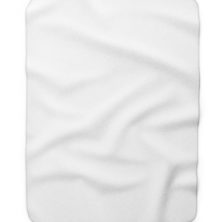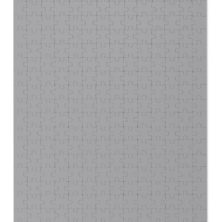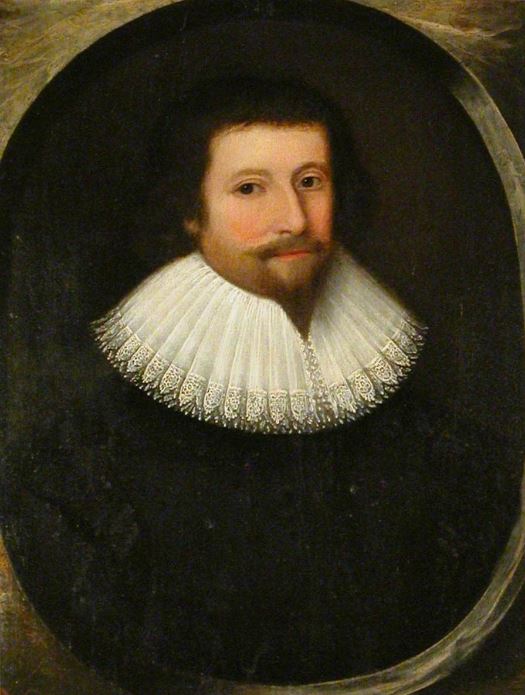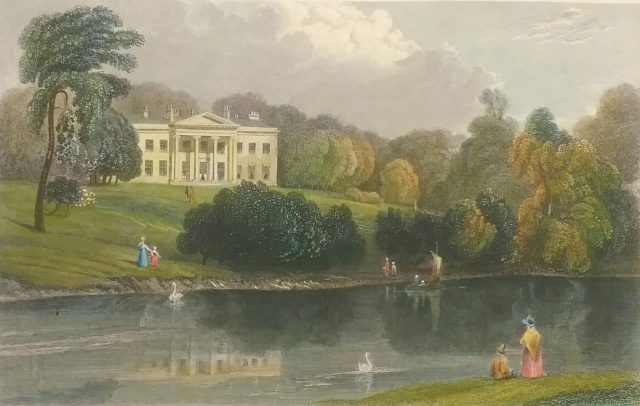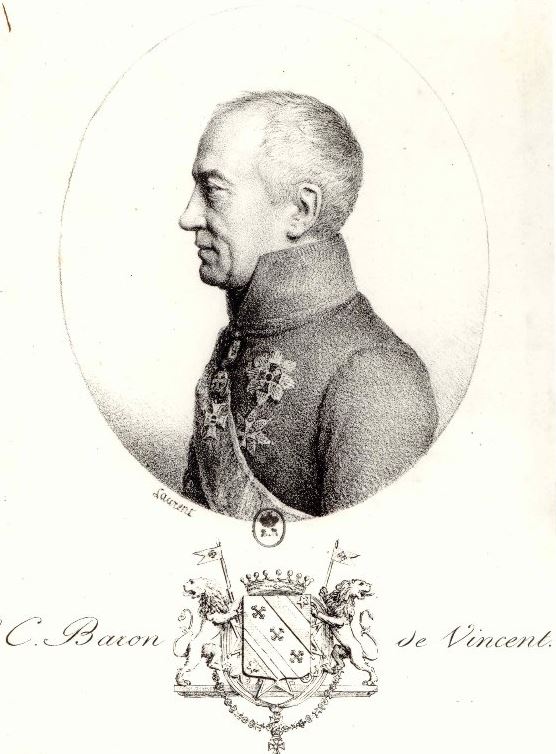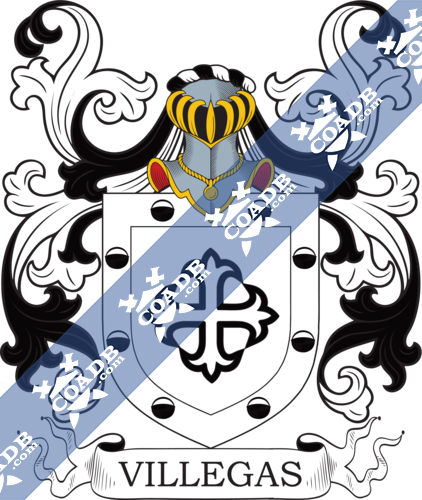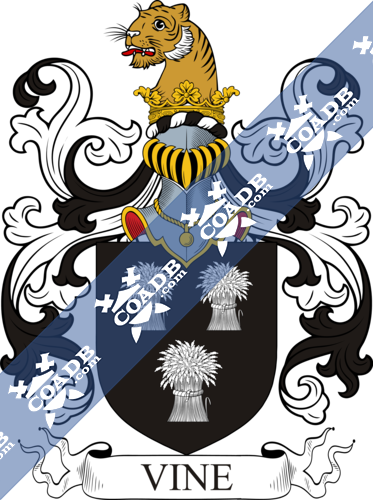Vincent Family Crest, Coat of Arms and Name History
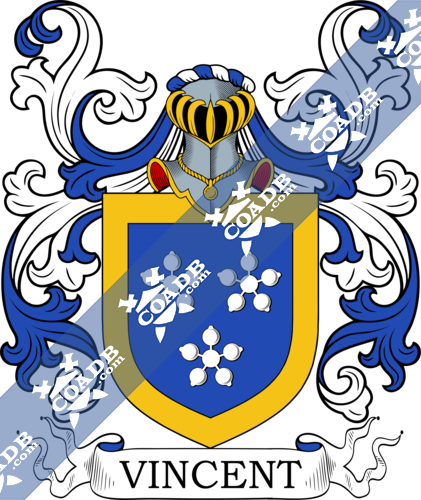
Vincent Coat of Arms Gallery
Don’t know which Coat of Arms is yours?
We can do a genealogical research. Find out the exact history of your family!
Learn MoreVincent Surname Name Meaning, Origin, History, & Etymology
This Anglo-French-Latin baptismal/patronymic last name means “the son of Vincent”. The personal (first) name Vince became a nickname or shortened/reduce form of the name, in the same Emma is for Emmet and Hugh is for Hewett. The masculine given name that was the source of this surname derives from the Latin or Roman name Vincentius, which derives from the word vincere, meaning to conquer. The name was popularized in medieval Europe by the Spanish martyr St. Vincent of Saragossa (also known as Vincent of Huesca or the Deacon) who lived during the 200s AD and died in 304 AD under Roman Emperor Diocletian, as well as several others Catholic saints, including a fifth century monk and writer of Lerins in the French Riviera. In Eastern Europe, the name became common because it was used by parents to honor Wincenty Kadlubek, a bishop of Krakow, Poland who lived in the 1200s AD. The name was used in England as early as the thirteenth century AD, and was also popular in other parts of Christendom and the Holy Roman Empire during the Middle Ages. Some sources claim the name made its way to England from France in mainland Europe during the Norman Conquest of 1066 AD, where the family first established itself in Leicestershire in central England. The name is a reference to the family’s original home or seat, St. Vincent de-Cramenil, Normandie. Lastly, it should also be noted that, in Ireland, the name was used an Anglicized version of the Gaelic surname MacDhuibhinse, meaning “son of the dark man of the island”.
Spelling Variations
Some spelling variants or names with similar etymologies include Vincents, Vincett, Vincenty, Vicente, Vientcent, Vinscent, Vinsant, Vincer, Vincenot, Vencent, Vynsand, Vinson, Vinsen, Vinsun and about 50 others.
Popularity & Geographic Distribution
The last name Vincent ranks 608th in popularity in the United Status as of the 2000 Census. The name ranks particularly high in the following eight states: Louisiana, Kentucky, Rhode Island, Michigan, Utah, New Hampshire, Montana, and Vermont. The name is very popular in France, ranking 24th. The surname Vincent frequency/commonness ranks as follows in the British Isles: England (407th), Scotland (1,057th), Wales (369th), Ireland (1,799th) and Northern Ireland (1,042nd). In England, it ranks highest in counties Cornwall, Dorset, and Norfolk. In Scotland, the surname ranks highest in West Lothian. In Wales, it ranks highest in county Merionethshire. In Ireland, it ranks highest in counties Cavan and Tipperary. In Northern Ireland, it ranks highest in county Down. The name is also present throughout the remainder English speaking world: Canada (279th), New Zealand (286th), Australia (450th), and South Africa (975th).
Early Bearers of the Surname
The first known recorded name was William Vincent, who was recorded in the Cartulary of Oseney Abbey in Oxfordshire, England in 1230 AD. The Hundred Rolls of 1273 AD, a census of Wales and England, known in Latin as Rotuli Hundredorum lists two bearers of this surname: Roger Vincent (Berkshire) and Richard filius (son of) Vincent (Huntindonshire). A one Agatha Vincent was documented in county Sussex, England (modern day Great Britain or United Kingdom) in 1296 AD. A one Miles Vincent owned land at Swinford, county Leicester, around 1316 AD
The Poll Tax of Yorkshire in 1379 AD lists one bearer of this last name: Johannes Vynsand. Two early marriages involving this surname were Judith Vincent to Richard Hart at St. Thomas the Apostle in London in 1581, as well as James Vincente to Lucy Batchellor in London in 1583. The Register of the University of Oxford lists one Francis Vincent in 1582.
Vincent Family Tree & Vincent Genealogy
Vincent of Boston Lodge
The lineage or ancestry of this branch of the Vincent family tree traces back to one John Vincent, Esquire, who was the Sheriff of Limerick in 1696. He was the Mayor of that city in 1703 and 1727. He married Phoebe Brown, widow of John Higginbotham, who had the following issue: John, Richard, Thomas, Arthur (Mayor of Limerick, married Blanche Waller, had issue named Arthur and John), Anne (married Venerable John Brown), Alice (married George Roche), Elizabeth (married John Davis), and Phoebe (married Matthew MacNamara). His son Thomas Vincent was an Esquire and Mayor of Limerick in 1726 and 1740. He married a woman named Alicia, and he had issue with her, including George, Exham (Mayor of Limerick in 1770, had issue named Exham, John Prendergast, and Anne), and Blanche. The eldest son George was an Esquire of Parteen House, county Clare, who was the Mayor of Limerick, Ireland in 1760. He married Anne, daughter of Reverend John Tunnadine, of Park, sister of John Tunnadine, and had three children with her as follows: Thomas (Sheriff of Limerick, married Miss Unthank, had two daughters and a son named George Vincent, Captain of the 4th Foot), George (twin with Thomas), John Tunnandine (of Hemsworth, Deputy Lieutenant, Lieutenant-Colonel of 3rd West York Militia, married Mary Read, had a son named John, later married Charlotte Fourness and had a son named Reverend Matson), Exham (of Violet Hill, married Marcella Going, had issue), Rebecca (married W. Long), Martha (married Nicholas Bischoff), and Anne (married J. McAdam). His son Geroge Vincent was a Captain of the 9th foot who served in American under the famous General Sir John Burgoyne, and was taken prisoner there. He was born in 1753, and in 1784, he married Elizabeth, daughter and co-heiress of William Read of Leeds and Hannah Buxton, and had four issue with her named as follows: Hannah, George (of Wakefield), William, and Thomas Buxton (of Scarborough). He died in 1831. His second son, William Read Vincent, was an Esquire of Boston Lodge, county York, was a Captain of the 3rd West York Militia born in 1790. In 1827, he married Sarah, daughter and co-heiress of John Clarke and Betty Vavasour, with him he had five children as follows: William Clarke (see below), John (of the Priory, Monk Sherborne, county Hants, Captain of the 76th Foot, married Ann Linton, had issue named William Henry Hutchinson, Thomas Montagu, Charles, Ada Cecile, and Alice Mary), Elizabeth Dorothy (married Robert Green of Sealby Hall), Sara Vavasour (married Captain Charles Newton Biggs, had issue named Charles William, Kathleen Sarah, and Ada Gertrude), and Emily Mary. His son William Clarke Vincent, Esquire of Boston Lodge, in county York, England, was born in 1828. The Vincent Coat of Arms (mistakenly and erroneously called the Vincent Family Crest) is blazoned in heraldry as follows: Azure, three cinquefoils argent and a border or. Crest: Out of a ducal coronet or, a griffin’s head gules charged with a trefoil. Motto: Vincent qui se vincent. This family was seated at Boston Lodge, near Tadcaster, county York.
Baronet Vincent
Sir Lacey Eric Vincent, 2nd Baronet, was educated at Mill Hill School and was born in 1902. He succeeded his father in 1943. He served in World War II. In 1938, he married Helen Millicent, daughter of Sir William Robert Robertson, and had two issue with her: William Percy Maxwell and Amanda Mildred. The lineage of Vincent genealogy traces back to his father, Sir Percy Vincent, 1st Baronet, Justice of the Peace, a Lieutenant for the City of London and Sheriff of said city as well, as well as Lord Mayor in 1935, who was born in 1868. He was the son of Lacey Andrews Vincent, of Watton, Norfolk, and was created a Baronet in 1937. In 1901, he married Christine Emily, daughter of George Horatio Board, and had one son and one daughter with her as follows: Lacey Eric (2nd Baronet) and Christinia Ena Comfort (married John S. Stevens). Sir Lacey Eric had a son named Sir William Percy Maxwell Vincent who became the 3rd Baronet, born in 1945.
The Vincent Arms are blazoned as follows: Azure, a chevron between two garbs in chief, and in base a castle, all or. Crest: In front of two bird-bolts points downwards, saltirewise or, a Labrador retriever dog statant sable. Motto: Fortitudine et conatu. They resided on Yeomans Row, Knightsbridge.
Viscount D’Abernon & Baronet Vincent
Viscount D’Abernon, of Esher and of Stoke d’Abernon in the county Surrey, England, was a title in the Peerage of the United Kingdom created in 1926 for the diplomat, politician and wrter, Edward Vincent, 1st Baron D’Abernon. He succeeded his older brother in 1936 as the 16th Baronet of Stoke d’Abernon. The Vincent Baronetcy was created in the England in 1620, for Sir Francis Vincent, 1st Baronet, who lived from around 1568-1640. He had a son named Sir Anthony Vincent, 2nd Baronet. Several generations down the family tree, Sir Frederick d’Abernon Vincent, who lived from 1852-1936, was the 15th Baronet.
Vincent Pedigree & Family Trees
A one Robert Vincent was born at in an unknown location and date. He married Catherin St. Mark and had a son with her named Thomas. His son Thomas married Margerett St. Marke and had a son with her named John. His son John Vincent was born in Bernake, Northamptonshire, England (modern day Great Britain or United Kingdom) in 1455 AD. He married a woman named Ann Hill and had a son with her named David. David was born in Long Ditton, Surrey, England who married Elizabeth Spencer and had daughter with her named Joan Mary. Joan Mary was born in Long Ditton, Surrey in 1506. She married John Elelyn and had issue with him, including a son named George.
A one Jehan Vincent was born in 1548. He had a son also named Jehan who was born in 1578. He in turn had a son named Michel. This Michel Vincent was born in 1616 and he married a woman named Jeanne and had a son with her named Pierre. Pierre Vincent was born in Alsace, Lorraine, France around 1631 and he married Anne Marie Gaudet in Acadia, Nova Scotia, Canada in 1663. They had the following issue together: Huguette Agathe, Thomas Soulan, Michel, Magdeleine, and Clement. His son Michel was born in Port Royal, Acadie, Canada in 1667. He married twice: Marie Josephe and Anne Marie. He had numerous issue named as follows: Marie, Agnes, Anne, Marguerite, Elizabeth Isabella, Claire, Pierre, Antoine, Jean Baptiste, Anne Marie, Madeline (Duhon), Elisabeth (Landry), Marie Marguerite (Saunier), Joseph, Charles, Anne Euphrosine, Michel, Marie Josephe (Duon), and Jeanne. His son Jean Baptiste Vincent was born in Pisiguit, New Brunswick, Canada around 1711. He married Elisabeth Comeau and had three children with her: Marguerite, Charles, and Elisabeth (Comeau). His son Charles was born around 1746 and he married Felicite Robichaud and had a son with her named Charles Honore. This Charles was born in St. Jacques-de-Bass, Montcalm, Quebec in 1775. He married Marie Marthe Poirier and had a son with her named Charles Lazare. This Charles Lazure (or Lazore) Vincent was born around 1820. He married Isabelle Allard and fathered several children with her as follows: Lazare, Salome, Honote Francois, Elizabeth, Emilie, Marie, Josephine, Louisa, Joseph, Noel, and Maxime. His son Joseph H. was born in Masawska Mission, Renfrew, Ontario, Canada in 1860. He passed away in the same town in 1934.
Early American and New World Settlers
William Vincent, and his wife whose name is not recorded, were recorded as living in Virginia, at “ye Neck of Land”, in February 1623. A one William Vincent, I assume the same one, owned 100 acres of planted land in “Charles Cittie”. John Vincent was a convicted rebel who was sent to the New World, Barbados in particular, in the late seventeenth century. Other early settlers in colonial America bearing this surname include Sarah Allerton Vincent (Massachusetts 1620), Adrian Vincent (New England 1633), Francis Vincent (New York 1719), John Vincent (Maryland 1726), Louis Vincent (Pennsylvania 1738), Madeleine Vincent (Pennsylvania 1753), and Francoise Vincent (South Carolina 1756).
In Canada, two of the first bearers of this last name were Jean Antoine Vincent and Michel Vincent, the later aged 20 years who arrived in Quebec in 1656. In 1710, Giles Vincent came to Connaigre, Newfoundland. In Australia, one of the first settlers bearing this surname was Mary Anne Vincent, a 16 year old house servant, who came to Holdfast Bay aboard the Africaine in 1836, following by John, Nicholas, and William, who all came to Adelaide in 1848, aboard the Hooghly, Poictiers, and Santipore, respectively. In New Zealand, William Edward Vincent, 17 years old, a printer by trade came to Port Nicholson aboard the Slains Castle in the year 1841.
Early Americans Bearing the Vincent Family Crest
Charles Bolton’s American Armory (1927) contains three entry for this surname: Azure three quatrefoils argent two and one. Crest: a demi-ram argent. Motto: Vincenti dabitur laurea. Bookplate Richard Vincent. Crozier’s General Armory (1904) and Matthew’s American Armoury and Bluebook (1907) do not contain an entries for this last name.
Mottoes
I have identified eight Latin Vincent family mottoes, translated into English:
1) Vincenti dabitur (It shall be given to the conqueror)
2) Virtute non viribus Vincent (They win by merit, not by force)
3) Vincent qui se (He conquers who endures)
4) Laurea Palma Cedrus Gloria Fama Decus (something about glory and fame?)
5) Fata Viam Invenient (Fate will find away)
6) Omnia Virtuti Cedunt (To all ground?)
7) Vincenti Dabo (Overcomes will?)
8) Fortitudine et conatu (Fortitude and effort)
Grantees
We have 59 coats of arms for the Vincent surname depicted here. The first 24 blazons are from Bernard Burke’s book The General Armory of England, Ireland, and Scotland, which was published in 1848. The remainder of the arms (35) are from Johan Rietstap’s Armorial General which was also published in the nineteenth century, primarily containing blazons/arms from mainland Europe. The bottom of this page contains the blazons, and in many instances contains some historical, geographical, and genealogical about where coat of arms was found and who bore it. People with this last name that bore an Vincent Coat of Arms (or mistakenly called the Vincent Family Crest)
1) Vincent, C.B., Post Captain, Royal Navy, of Berkshire
2) Vincent to Sheldon, county Warwickshire and Worcestershire, 1828
Notables
There are hundreds of notable people with the Vincent surname. This page will mention a handful. Famous people with this last name include: 1) Clinton D. “Casey” Vincent (1914-1955) who was an American flying ace born in Gail, Texas who became the second youngest general officer in the US Air Force, having served in the China-Burma-India theatre of World War II, 2) Francis Thomas Vincent Jr. (1938) was a lawyer who became the eighth Commissioner of Major League Baseball, born in Waterbury, Connecticut, 3) Gene Vincent (1935-1971), whose birth name was Vincent Eugene Craddock, was an American rock and roll and rock ability musician born in Norfolk, Virginia who is best known for his hit song “Be-Bop-A-Lula”, 4) Henriette Vincent (1786-1834) was a painter of botanicals at the French royal court, 5) Sir Hugh Corbet Vincent (1862-1931) who was an Welsh rugby player from Caenarfon, 6) Jamie Vincent (1975) was a former football (soccer) player born in Wimbledon, London who played for 12 different teams between 1993-2012, 7) John Vincent (1764-1848) who was a General and British commanding offer of the Niagara Peninsula in Canada during the US attack in the War of 1812, born in Ireland, 8) June Vincent, whose birth name was Dorothy June Smith, was an American actress born in Harrod, Ohio who had roles in over 50 films, as well as numerous TV roles, 9) Air Vice Marshal Stanley Flamank Vincent (1897-1976) who was a pilot and senior commander of the British Royal Air Force who served in both World Wars, born in Hampstead, London, England, and 10) Robert Vincent (1956) who was a politician from Quebec who served in the Canadian Parliament for Shefford from 2004-2011.
Blazons & Genealogy Notes
1) (Stoke D’Abernon, co. Surrey, and Debden Hall, co. Essex, bart.). (Trelevan In Mevagisscy, Tresimple in St. Clements, and Batten in Northill, co. Cornwall. The Vincents, of co. Cornwall, were sued in the Earl Marshal’s Court for bearing the paternal coat of Vincent, of Stoko D’Abernon, and fined; they subsequently had licence from the Vincents, of co. Furrey, to continue the use of the ensigns). Az. three quatrefoils ar. Crest—Out of a ducal coronet ppr a bear’a head ar. Mottoes—Vincenti dabitur; and, Virtuto non viribus Vincent.
2) (Pickleton, co. Leicester, and Messingham, co. Lincoln; William Vincent, of Pickleton, 1601, son of Edward Vincent, and grandson of George Vincent, who was son of Richard Vincent, Esq., of Messingham, 20 Edward IV., a.d. 1480. Visit. Leicester, 1619). Az. three quatrefoils ar., quartering, 1st, Grimsby; 2nd, Vullis; 3rd, Moton; 4th, Basset; 5th, Colvile; 6th, Champaine; 7th, Bagge. Crest—A demi ram ramp. couped sa. horned and collared or.
3) (Wilford, co. Notts; George Vincent, of Wilford, temp. James I., son of George Vincent, b. 1484, d. 7 Queen Elizabeth, aged 80 years, and grandson of Richard Vincent, of Messingham, 20 Edward IV., 1480. Visit. Notts, 1614). Quarterly, 1st, az. three quatrefoils ar.; 2nd, barry nebulée of four or and gu. on a chief ar. three birds sa.; 3rd, ar. a chev. sa. betw. three boars’ heads gu. a border engr. oi the last; 4th, ar. a cinquefoil az.; 5th, quarterly, 1st and 4th, or, three piles, points meeting in base gu. a canton vair, 2nd and 3rd, or, a fess gu.; 6th, or, fretty sa. Crest—A demi ram ramp. sa. collared and armed or.
4) (Thrinkston, co. Leicester). Az. three cinquefoils ar. Crest—A demi ram ar.
5) (Smeton, co. Norfolk). Az. three quatrefoils slipped ar.
6) (co. Norfolk). Az. three trefoils slipped ar.
7) (Thingdon, co. Northampton). Az. three cinquefoils ar. a border engr. of the last. Crest—Out of a ducal coronet or, a bear’s head ar. gorged with a belt sa.
8) (co. Northampton; granted to Augustine Vincent, Esq., Windsor Herald, temp. Charles I., d. 11 Jan. 1626). Or, on a pile az. three quatrefoils pierced ar. Crest—Out of a ducal coronet or, a bear’s head ar. collared sa.
9) (Wilford, co. Nottingham). Az. three quatrefoils ar. Crest—A demi ram sa. collared or.
10) (Kinver, co. Stafford, and Stockton, co. Worcester; stated to have been of the family of Lovell, Lord Lovell: one Vincent Lovell escaped from the battle of Stoke Field, 1487, and lived in concealment, whose “sonne called himself Vincent”; arms certified by Segar, Garter). Az. a chev. betw. three quatrefoils slipped ar. Crest—A talbot statant ar. eared or, collared and lined gu. the end of the line tied in a bunch.
11) (Kempsey, co. Worcester; arms from the monnment of Thomas Vincent, BarriateT-at-law, in Kempsey Church, d. 1712, son of John Vincent, Barrister-at-law). Az. three quatrefoils ar. Crest—A. bear’s head erased gu. muzzled or.
12) (co. Surrey). Or, on a chev. betw. three demi lions ramp. gu. as many trefoils alipped ar. Crest—A bull’s head cabossed ar. guttée de poix, armed or.
13) (Boston Lodge and Hemsworth, co. York). Az. three cinquefoils ar. a border or.
14) (co. Warwick). Or, on a pile az. three quatrefoils of the first.
15) (Firby and Warmsworth, co. York). Ar. two bare gu. on a canton of the second a fleur-de-lis or (another, a trefoil slipped). Crest—Out of a ducal coronet or, a bear’s head gu.
16) (co. York). Gu. a fess and chief or, on a canton of the first a trefoil slipped of the second.
17) Az. three roses or. Crest—A demi ram sa. armed and gorged with a collar or.
18) Az. three quatrefoils ar. a border of the last.
19) Gu. on a pile az. three quatrefoils ar.
20) Or, on a fess az. three quatrefoils ar.
21) Az. on two bars ar. six quatrefoils of the first.
22) (impalement Fun. Ent. Ulster’s Office, 1643, William Fletcher, of London, slain before tho city of Gloucester, whose wife was Abigal, dau. and heir of Henry Vincent, Esq.). Az. a chev. betw. three quatrefoils slipped ar.
23) (impalement Fun. Ent. Ulster’s Office, 1676, George Blunt, of Balleran, co. Kildare, whose wife was Sarah Vincent). Az. three quatrefoils ar.
24) (Boston Lodge, co. York; confirmed to William Clarke Vincent, Esq., of Boston Lodge, and to the other descendants of his great-grandfather, George Vincent, Esq., of Parteen, co. Clare, Mayor of Limerick 1761). Az. three cinquefoils ar. a border or. Crest—Out of a ducal coronet or, a griffin’s head gu. charged with a trefoil slipped gold. Motto: Vincent qui se vincent.
25) Marquis d’Equevilley – Franche-Comté, Espagne – D’argent à la bande de gueules acc de six coquilles du même rangées en orle. English: Argent a bend gules accompanied by six escallops of the same arranged in orle.
26) Marquis d’hautecourt – Ponthieu – D’azur au chevron d’or acc de trois licornes saillantes d’argent les deux du chef affrontées Cimier une licorne issante Supports deux licornes Devise LAUREA PALMA CEDRUS GLORIA FAMA DECUS. English: Azure a chevron or accompanied by three unicorns saillant [leaping forward] argent the two from the chief affrontant [face to face] Crest: a unicorn issuant Supporters two unicorns Motto: LAUREA PALMA CEDRUS GLORIA FAMA DECUS.
27) Lyonnais – D’or au chevron acc en chef de deux croissants et en pointe d’un coeur enflammé le tout de gueules au chef d’azur ch de trois étoiles du champ. English: Or a chevron accompanied by in chief two crescents and in base a heart inflamed all gules a chief azure charged with three etoiles of the field.
28) Lorraine – (An., 26 janv. 1565) – Écartelé en sautoir aux 1 et 4 d’or à une tête de léopard d’azur aux 2 et 3 d’azur à un besant d’or. English: Quarterly per saltire 1st and 4th or with a head of a lion passant guardant azure 2nd and 3rd azure with a bezant or.
29) Lorraine – (Barons, 8 août 1764) – D’azur à la bande coticée d’argent ch de trois croix tréflées de gueules et acc de deux quintefeuilles de gueules. English: Azure a bend cotticed argent charged with three cross botonny gules and accompanied by two cinquefoils gules.
30) Marseille – D’azur au chevron d’or acc de trois palmes du même. English: Azure a chevron or accompanied by three palm branches of the same.
31) Sens – (Arm. gén. de 1696) Pierre V. conseiller au présidial – D’azur au chiffre d’or composé des lettres de son nom d’or entrelacées. English: Azure a figure or composed of the letters of his name interlaced or interlaced.
32) Tarascon – (De Rozière) – D’argent à un laurier de sinople terrassé de même au chef d’azur chargé d’une étoile d’or. English: Argent with a laurel bush vert on a mount of the same a chief azure charged with a etoile or.
33) Sens – (Arm. gén. de 1696) Oloivier-Paul Chanoine – De sable à un chevron d’argent chargé de deux palmes de sinople et acc de trois couronnes de feuilles de chêne d’or. English: Sable with a chevron argent charged with two palm branches vert and accompanied by three crowns of leaves of oak or.
34) Neufchâtel – (Tripet) – De gueules au pal d’argent chargé d’un cep de vigne au naturel fruité de quatre pièces et soutenu d’un tertre de trois coupeaux de sinople ledit pal accosté de deux épées d’argent germes d’or adossées. English: Gules a pale argent charged with a vine shoot proper fructed of four pieces and standing on a hillock of three peaks vert the aforesaid pale having to the sides two swords argent pommells or addorsed [back to back].
35) Provence – (Arm. gén. de 1696) Règl. d’arm. pour Claude marchand à Sisteron. – D’azur à un coeur d’argent acc en chef d’un soleil d’or accosté de deux étoiles du même en fasce des deux lettres capitales C V aussi d’or et en pointe d’un croissant renversé d’argent accosté de deux besants d’or. English: Azure with a heart argent accompanied by in chief a sun or having to the sides two etoiles of the same fesswise of two capital letters C V also or and in base a crescent reversed argent having to the sides two bezants or.
36) Lorraine – (An., 1627) – D’azur à une hure de sanglier de gueules au chef d’argent ch de trois roses de gueules. English: Azure with the head of wild boar gules a chief argent charged with three roses gules.
37) Comtat-Venaissin – Elzéar V. vicaire général de l’évêque de Carpentras – D’argent au chevron de gueules acc en chef de deux étoiles d’azur et en pointe d’un croissant du mesme. English: Argent a chevron gules accompanied by in chief by two etoiles azure and in base a crescent of the same.
38) Dauphiné – De gueules à la bande d’hermine. English: Gules a bend of ermine.
39) Avignon – Registre du trésorier général Hierôme , 1732 – D’argent à un arbre arraché de sinople au chef de gueules chargé d’un croissant d’argent entre deux étoiles d’or Casque avec lambrequins. English: Argent with a tree eradicated vert a chief gules charged with a crescent argent between two etoiles or helmet with mantling.
40) (Baron) – Lorraine – Alias Les armes ci-dessus mais les quintefeuilles remplacées par deux étoiles d’argent Cimier une armure issante surmontée du cimier précédent Supports deux lions tenant chacun une bannière chargée d’une croix recroisettée. English: Alternatively the coat of arms above but cinquefoils replaced by two etoiles argent Crest: a knight in armour issuant surmounted by the previous crest Supporters two lions holding each a square flag charged with a cross crosslets. [Not sure which arms the “above” is referring to here]
41) (Baron) – Lorraine – Anob. 24 décembre 1615, Barons 8 août 1764, (Arch. des coll. d’Ex-Libris – D’azur à la bande d’argent accostée de deux cotices du même chargée de trois croisettes recroisettées de gueules et acc de deux quintefeuilles d’or boutonnées du même Cimier une ancre d’argent à laquelle est pendue une voile d’argent chargée d’une croisette de l’écu Lambrequin aux couleurs de l’écu Supports deux lions Devise FATA VIAM INVENIENT. English: Azure a bend argent having to the sides two bendlets of the same charged with three crosslets re-crossed gules and accompanied by two cinquefoils or budded of the same Crest: an anchor argent from which is hanging a sail argent charged with the crosslet of the shield Mantling: the colours of the shield Supporters two lions Motto: FATA VIAM INVENIENT.
42) Dauphiné, Lyonnais – Écartelé aux 1 et 4 de gueules à trois bandes d’argent au chef d’hermine aux 2 et 3 d’azur au chevron acc en chef de deux besants et en pointe d’une croix ou d’un lion le tout d’or. English: Quarterly 1st and 4th gules three bendlets argent a chief of ermine 2nd and 3rd azure a chevron accompanied by in chief two bezants and in base a cross (alternatively) a lion all or.
43) Lorraine – (An., 10 août 1626) – D’azur au chevron d’or acc en chef de deux couronnes du même. English: Azure a chevron or accompanied by in chief two crowns of the same.
44) Lorraine – (An., 14 déc. 1615) – D’azur à trois croix fleurdelisées d’or rangées entre deux fasces d’argent. English: Azure three cross fleur-de-lys or arranged between two bars argent.
45) Limousin – (Arm. gén. de 1696, Limousin) Sgrs. de Thède – D’azur à une aigle d’or la tête contournée. English: Azure with an eagle or the head reversed.
46) Genève, Lausanne – D’argent à un olivier arraché de sinople fruité de trois pièces mal-ordonnées d’or. English: Argent with an olive tree eradicated vert fructed of three pieces disordered [1 2] or.
47) Hollande – D’or à une rose de gueules. English: Or with a rose gules.
48) d’Agoult – Provence – La famille de a pris le nom et les armes d’Agoult depuis Fouquet Vincent, fils de Marie Sauve de Marseille, épouse de Jean Vincens, Sgr. de Rognes. Fouquet d’Agoult – Les armes des d’Agoult d’or au loup d’azur au collier d’argent (pour brisure). English: The coat of arms of d’Agoult – Or a wolf azure collar argent ( for cadency ).
49) de Bonlieu – Dauphiné – Sieurs de Bonlieu, Rambion, Panettes, also de Panettes – P. de Dombes – Casque Cimier une aigle naissante d’argent portant à son bec une couronne de laurier de sinople Supports deux aigles d’argent becquées et membrées d’or portant chacune dans son bec une couronne de laurier de sinople Devise OMNIA VIRTUTI CEDUNT. English: Helmet Crest[???] an eagle rising argent carrying in its beak a crown of laurel vert Supporters two eagles argent beaked and legged or carrying each in its beaks a crown of laurel vert Motto: OMNIA VIRTUTI CEDUNT.
50) de Bonlieu – Dauphiné – (N. Chorier) – Ajouter Supports deux aigles d’argent becquées et membrées d’or et tenant dans leur bec chacune une couronne de laurier de sinople Cimier une aigle issante semblable à celle des supports. English: Additionally Supporters two eagles argent beaked and legged or and holding in their beaks each a crown of laurel vert Crest: an eagle issuant resembling that of Supporters.
51) de Bonlieu – Dauphiné – De gueules à un foudre d’or lié et lancé d’argent ailé de sinople Devise VINCENTI DABO. English: Gules with a thunderbolt or tied [banded] and striking argent winged vert Motto: VINCENTI DABO.
52) de Debden – Essex – (Baronet, 26 juillet 1620) – D’azur à trois quartefeuilles non-percées d’argent Casque couronné Cimier une tête et col d’ours d’argent Devise VINCENTI DABITUR. English: Azure three quatrofoils (unpierced) argent Crowned with a helmet Crest: a head and shoulder of a bear argent Motto: VINCENTI DABITUR.
53) de Montjustin – Franche-Comté – D’argent à la bande de gueules acc de six coquilles du même rangées en orle. English: Argent a bend gules accompanied by six escallops of the same arranged in orle.
54) de Rambion – Dauphiné – D’argent à la bande de gueules acc de six coquilles du même rangées en orle. English: Argent a bend gules accompanied by six escallops of the same arranged in orle.
55) de Saint-Bonnet et de Vaugelas – Forez, Lyon – D’azur au chevron d’or surmonté d’un soleil du même et acc en chef de deux raisins d’argent et en pointe d’une tour du même couronnée d’or. English: Azure a chevron or surmounted by a sun of the same and accompanied by in chief two grapes argent and in base a tower of the same crowned or.
56) des Arsins (d’Artaufontaine et de Poligny) – Franche-Comté – De gueules à trois quintefeuilles d’argent au chef triangulaire d’hermine. English: Gules three cinquefoils argent a chief triangular of ermine.
57) de Tournon – Ponthieu – Écartelé aux 1 et 4 parti a d’azur semé de fleurs-de-lis d’or b de gueules au lion d’or au 2 d’azur à six besants d’or et au chef du même au 3 d’azur à trois étoiles d’or et à la bordure de gueules Sur le tout d’azur au chevron d’or acc de trois licornes saillantes d’argent les deux du chef affrontées. English: Quarterly 1st and 4th per pale a) azure semy of fleur de lys or b) gules a lion or 2nd azure with six bezants or and a chief of the same 3rd azure three etoiles or and a bordure gules on an escutcheon azure a chevron or accompanied by three unicorns saillant [leaping forward] argent the two from the chief affrontant [face to face].

